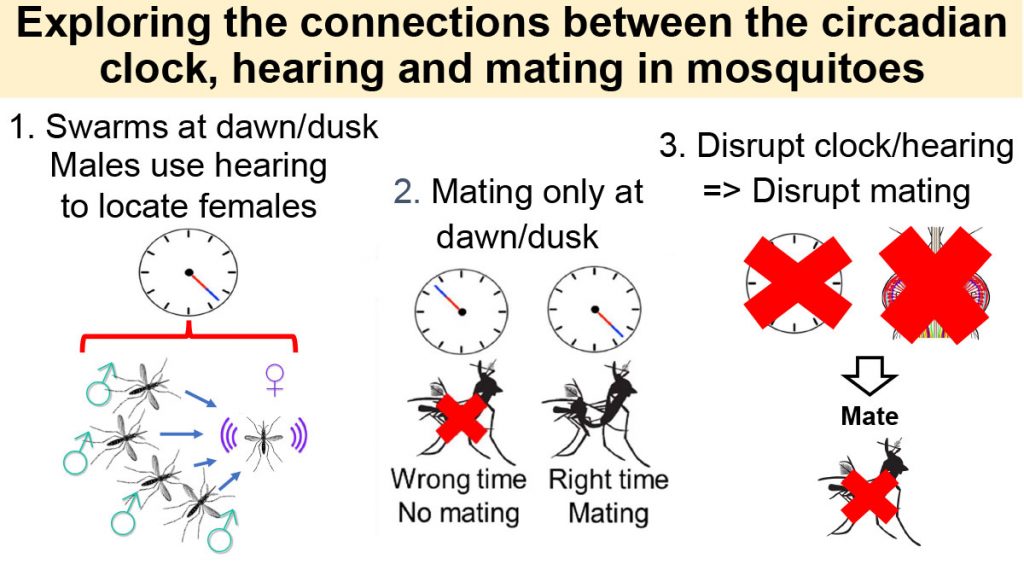Mechanosensory biology
Chronobiology
Insect biology
Biophysics

スー マシュー ポール
Matthew Paul SU
2021年度採用
名古屋大学
高等研究院 / 大学院理学研究科
YLC特任助教
研究領域:ライフサイエンス
専門分野
キーワード
Mosquitoes
Hearing
Swarming
Circadian clock
所属学協会
日本神経科学学会
日本分子生物学会
主な研究内容
Hundreds of millions of people worldwide are infected with mosquito-borne diseases every year. The seemingly ever-expanding global range of mosquitoes, coupled with rising rates of insecticidal resistance, makes the development of novel methods of mosquito control a major priority to prevent increases in the number of infections. This development first requires improving our knowledge of basic mosquito biology, particularly regarding highly conserved behaviors such as mating.
Mosquito mating typically occurs with large, male-dominated aggregations known as ‘swarms’. These swarms form only at specific times of day (dawn and dusk), suggesting a strong circadian influence on the timing and duration of swarming behavior. Furthermore, males identify conspecific females within swarms by listening for the distinctive frequencies of sound females generate during flight. This is possible because of the different sound frequencies males and females produce whilst flying (~800Hz and ~550Hz respectively), and the incredibly sensitivity of the male mosquito hearing systems. In addition, male mosquito responses to sound peak during swarming times, implying a potential direct impact of the circadian clock on mosquito hearing behaviors. Both hearing and the circadian clock thus influence mating, making them potential targets for innovative methods of mosquito control. It remains unclear however exactly how the mosquito clock, hearing and mating are linked.
My research therefore focuses on first investigating the underlying mechanisms which connect the circadian clock, hearing and mating in mosquitoes, then devising methods of interfering with these connections to disrupt mating behaviors and collapse mosquito populations. This includes both the use of sound traps/lures to attract males to sound sources where they can be killed, and the testing of insecticides which target clock or hearing function.
To investigate the connections between the clock, hearing and mating, I utilize a multi-level analysis paradigm including molecular, anatomical, functional and behavioral experiments. This includes mutant generation using CRISPR/Cas9 methodologies, electrophysiological recordings of ear function and semi-field work assays testing the effect of trial interventions on population sizes over multiple generations. This is possible thanks to international and interdisciplinary collaborations involving laboratories split over several continents.
In the future, I intend to focus more and more on translating my research from lab-based assays to semi-field/field experiments. This will require establishing further collaborative partners, including not only ecologists with experience of field testing, but mathematical modelers and policy makers who can help guide effective implementation of promising new control methods. Perhaps most importantly, I want to work closely with chemists who have access to a wide array of pharmacological compounds which can interfere with circadian clock function.



![]()
論文
Representative papers:
Su MP*, Georgiades M*, Bagi J, Kyrou K, Crisanti A, Albert JT. ‘Assessing the acoustic behaviour of Anopheles gambiae s.l. dsxF mutants: Implications for Vector Control’. Parasites & Vectors; 13; 507. 2020. (*Su MP and Georgiades M contributed equally to this work)
Su MP, Andres M, Boyd-Gibbins N, Somers J, Albert JT. ‘Sex and Species Specific Hearing Mechanisms in Mosquito Flagellar Ears’ Nature Communications; 9(1): 3911. 2018.
研究紹介
本事業を通じて解決を目指す世界的課題
Reducing global Aedes aegypti mosquito-borne disease transmission by developing control tools targeting the circadian clock
Around 40% of the world’s population is at risk of the dangerous diseases transmitted by Aedes aegypti mosquitoes, making new methods of mosquito control badly needed. As Aedes aegypti mating is a highly circadian behavior, disrupting their circadian clock could significantly interfere with mating, leading to population collapse. However, our basic knowledge of the Aedes aegypti circadian clock is currently poor.
In my project, I aim to improve our knowledge of this circadian clock and develop novel methods to control global Aedes aegypti populations by targeting their clocks. I will first develop models of the molecular Aedes aegypti circadian clock via generation of novel transgenic lines. I will then conduct screens to identify compounds which disrupt mating via interfering with clock function. Finally, I will test the most promising compounds in lab/semi-field settings to optimize delivery pathways to reduce mosquito populations in realistic environments.
インタビュー
インタビューはありません

